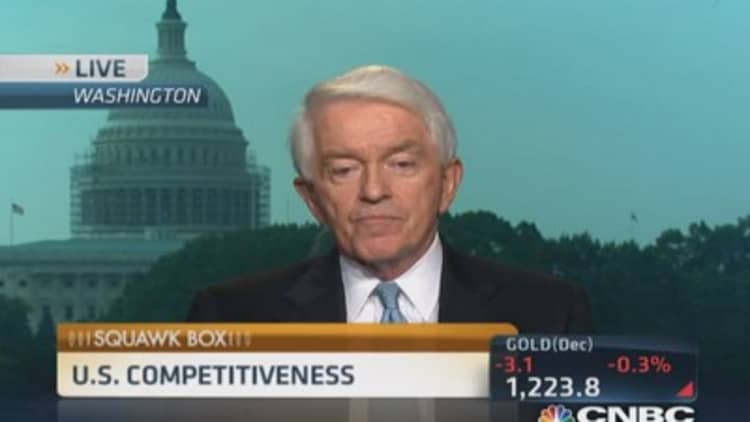U.S. stocks mostly rose on Friday, with the Dow finishing at a record, as investors welcomed Alibaba's market debut and Scotland's vote to remain in the U.K.
Read MoreLive blog: Alibaba, the biggest IPO ever
"It's a combination of Alibaba coming to market as well as the election in Scotland; there was underlying concern that that may not go well," said Paul Nolte, senior vice president, portfolio manager at Kingsview Asset Management.
Just over 55 percent of Scottish voters supported sticking with the nation's 307-year union with the U.K. after Prime Minister David Cameron vowed to give additional policy-making powers to Scotland.
Alibaba surged in in the Chinese online retailer's U.S. trading debut after the company raised nearly $22 billion in an initial public offering, the largest IPO ever.
"Investors were clearing some space to buy Alibaba," said Nolte, noting selling in technology shares earlier in the week.
"Now we'll get back to what passes for normal," he added.
Oracle shares dropped, a day after co-founder Larry Ellison stepped down as CEO; Concur Technologies jumped after SAP said it would buy the company for about $7.4 billion and Apple wavered before finishing 0.8 percent lower on the first day of sales of its iPhone 6 and iPhone 6 Plus.
Friday's session also brought a quarterly scenario known as quadruple witching, with futures and options contracts on indexes as well as individual stocks expiring. The event would likely lead to increased trading volume, but probably not so much volatility, Nolte said.
Major U.S. Indexes
Scaling back from an 84-point gain that had it setting another intraday record, the Dow Jones Industrial Average ended up 13.75 points, or 0.1 percent, at 17,279.74, leaving it 1.7 percent higher on the week, with Microsoft pacing blue-chip gains that extended to 18 of 30 components.
After setting an all-time high during the session, the lost nearly a point to 2,010.40, less than a point below its record close, achieved the prior day, and 1.3 percent higher from the week-ago finish.
Technology and financials fell the hardest and utilities and telecommunications led gains among the S&P's 10 major sectors.
The CBOE Volatility Index, a measure of investor uncertainty, rose 0.7 percent to 12.11.
After rising to its highest since March 2000, the Nasdaq shed 13.64 points, or 0.3 percent, to 4,579.79.
For every two shares rising, roughly three declined on the NYSE, where 1.8 billion shares traded. Composite volume surpassed 4.9 billion.
The dollar advanced against other global currencies to tally a 10th weekly gain, and the yield on the 10-year Treasury note fell 4 basis points to 2.577 percent.
On the New York Mercantile Exchange, gold and crude futures declined, with the gold contract for December down $10.30, or 0.8 percent, at $1,216.60 an ounce and October crude losing 66 cents to $92.41 a barrel.
"Commodities have been in a terrible situation most of this year. Oil, gold, soybeans, corn, those prices have been falling and that's part of the reason why we're looking at a Fed that will continue to be disappointed with inflation," said Nolte.
The Conference Board's index of leading indicators rose 0.2 percent in August versus expectations for a 0.4 percent gain.
U.S. stocks rose on Thursday, with the S&P 500 and Dow industrials toppling records, as investors considered mixed economic reports on jobs and the housing market and continued to relish the Federal Reserve's renewed vow to keep benchmark rates low.
Read MoreS&P 500, Dow end at record peaks in Fed-fueled rally
"We're been overvalued for a long time, on a trailing basis. We can stay overvalued for a couple of years before events conspire to change that. I don't see a recession on the horizon, so stocks can continue on their merry way higher," said Nolte.

—By CNBC's Kate Gibson
More From CNBC.com:


